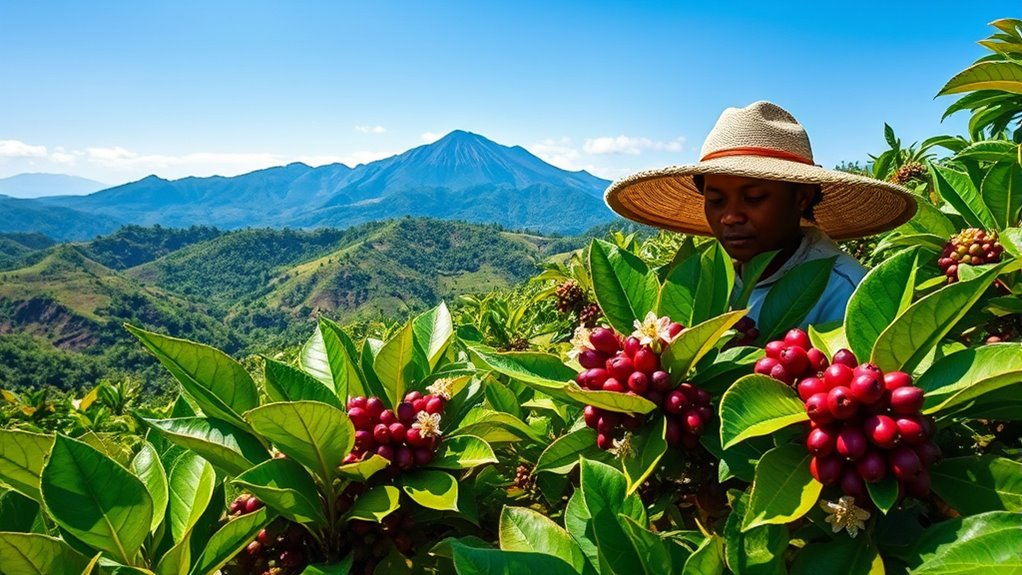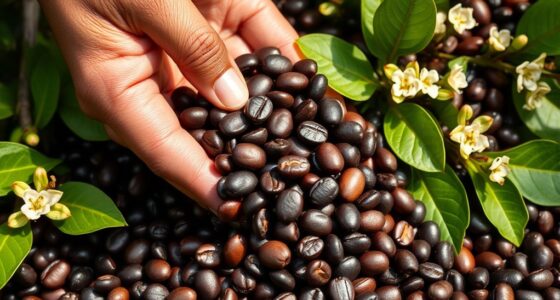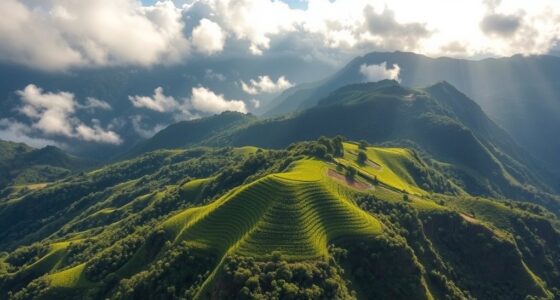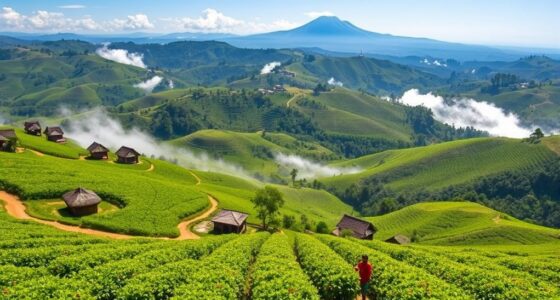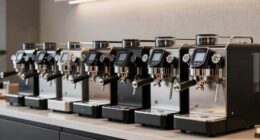In Uganda, you’ll find a rich coffee culture focused on high-quality Bugisu Arabica and Robusta beans. Farmers carefully harvest ripe cherries by hand, choosing only the best for processing. Various methods like washed or natural processing shape the coffee’s flavor, while expert roasting techniques highlight its unique notes — from bright and fruity to bold and earthy. If you want to discover how these practices create exceptional coffee, keep exploring what makes Uganda’s beans stand out.
Key Takeaways
- Bugisu Arabica is renowned for its bright acidity, fruity notes, and complex flavor profile, cultivated at high altitudes in Uganda’s Mist Mountain region.
- Robusta coffee from Uganda offers a bold, earthy taste with higher caffeine content, primarily grown in lowland areas like the Central and Western regions.
- Harvesting involves handpicking ripe cherries, with timing crucial for quality; processing methods like washed or natural influence flavor nuances.
- Roasting techniques tailored to each coffee type enhance their unique qualities, from light to dark profiles, highlighting Uganda’s diverse offerings.
- Uganda’s coffee culture emphasizes craftsmanship, with artisans focusing on quality from harvest through roasting to produce premium Bugisu Arabica and Robusta.
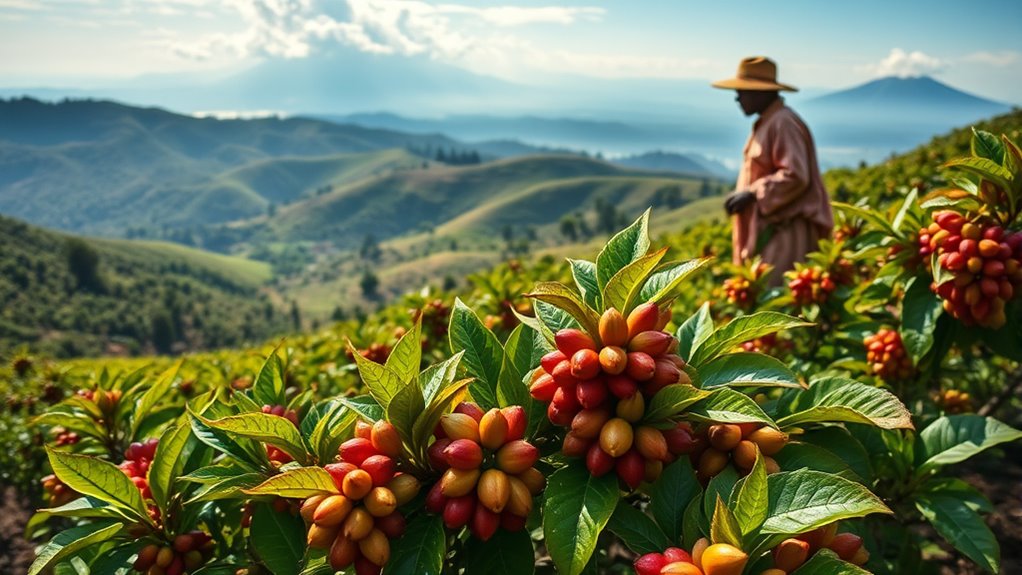
Are you curious about Uganda’s rich coffee culture? If so, you’re about to discover a world where coffee isn’t just a beverage but a essential part of the country’s identity. Uganda’s coffee journey begins with the meticulous process of coffee harvesting. You’ll find that local farmers often pick ripe cherries by hand, selecting only the best to guarantee quality. The timing of the harvest is paramount; ripe cherries turn a vibrant red, signaling that they’re ready for plucking. This careful selection guarantees that only the highest quality beans move forward, maintaining Uganda’s reputation for premium coffee. After harvesting, the beans undergo processing, which can influence the flavor profile considerably. Whether it’s washed, semi-washed, or natural processing, each method imparts unique characteristics to the coffee. Once processed, the beans are dried and prepared for the next essential step: roasting.
Coffee roasting techniques are a cornerstone of Uganda’s coffee culture. When you think about roasting, imagine the transformation of green beans into aromatic, flavorful coffee. The roasting process demands attention to detail, as it determines the final taste and aroma. Many local roasters prefer traditional methods, using simple roasters over open flames or hot air. They often roast in small batches, allowing for careful control over temperature and duration. Light roasts preserve the beans’ original brightness and acidity, highlighting the fruitiness of Bugisu Arabica, while darker roasts bring out deeper, smoky tones, often favored for Robusta. As you explore Uganda’s coffee scene, you’ll notice that skilled roasters constantly tweak their techniques to enhance specific flavor notes. They evaluate the beans’ crackling sounds, color, and aroma throughout the process, ensuring each batch reaches perfection. Additionally, roasting techniques can significantly influence the development of flavor and aroma in the final cup.
The art of coffee roasting in Uganda isn’t just about technique; it’s about respecting the beans’ origins. This attention to detail helps bring out the unique qualities of the Bugisu Arabica, known for its bright, complex flavor profile, and Robusta, with its bold, earthy notes. Whether you prefer a light, floral brew or a robust, full-bodied cup, the roasting techniques employed by local artisans highlight Uganda’s diverse coffee offerings. From the farms where cherries are carefully picked to the roasting tables where beans are transformed, every step reflects a deep passion for quality and tradition. Embracing Uganda’s coffee culture means appreciating the craftsmanship behind each cup, recognizing that every sip embodies the country’s dedication to producing some of Africa’s finest coffee.
Frequently Asked Questions
What Are the Health Benefits of Uganda Coffee?
You’ll enjoy several health benefits from Uganda coffee. It’s packed with antioxidant properties that help combat free radicals, supporting your overall health. Plus, the caffeine boosts your mental alertness, keeping you focused and energized throughout the day. Drinking Uganda coffee in moderation can also improve mood and may lower the risk of certain diseases. So, savor your coffee knowing it offers these health perks while energizing your mind.
How Does Climate Change Affect Bugisu Coffee Production?
Climate change impacts Bugisu coffee production by altering rainfall patterns and increasing temperatures, making it harder to grow high-quality beans. You need to focus on building climate resilience through crop adaptation strategies like selecting resilient coffee varieties and adjusting planting schedules. These measures help protect your coffee crops from unpredictable weather, ensuring sustainable yields and quality despite changing climate conditions.
Which Brewing Methods Best Suit Bugisu Arabica?
Imagine opening a treasure chest—your brewing method reveals Bugisu Arabica’s rich, complex flavors. A French press emphasizes full-bodied taste with its immersion process, while a pour-over highlights delicate nuances and bright acidity. Both methods suit Bugisu Arabica, letting you enjoy its vibrant aroma and intricate notes. Choose the French press for boldness or the pour-over for clarity; either way, you’ll savor Uganda’s finest beans.
Are There Sustainable Farming Practices in Uganda’s Coffee Industry?
Yes, Uganda’s coffee industry adopts sustainable farming practices. You’ll find farms with organic certification, ensuring chemical-free cultivation that protects the environment and improves coffee quality. Fair trade initiatives also support farmers by providing fair wages and better working conditions. These practices promote ecological balance and social equity, helping you enjoy ethically produced Bugisu Arabica and Robusta. Supporting these efforts encourages sustainable growth and preserves Uganda’s rich coffee heritage.
How Can I Identify Authentic Uganda Coffee in Stores?
You can spot authentic Uganda coffee by checking for proper coffee certification labels, which guarantee quality and origin. Look for certifications like Fair Trade or Organic on the packaging, indicating store authenticity. Remember, Uganda is known for producing over 4 million bags annually, so genuine coffee often bears these marks. Always buy from reputable stores or suppliers that provide transparent information about their coffee’s origin, ensuring you’re getting the real deal.
Conclusion
Now that you know about Uganda’s unique coffee varieties, you’ll appreciate why the country produces over 4 million bags annually. With Bugisu Arabica thriving at high altitudes and Robusta flourishing in the lowlands, Uganda’s coffee scene is truly diverse. Next time you sip your brew, remember that each cup supports thousands of local farmers and their rich traditions. It’s a flavorful journey rooted in passion, history, and a remarkable 15% global coffee share.
